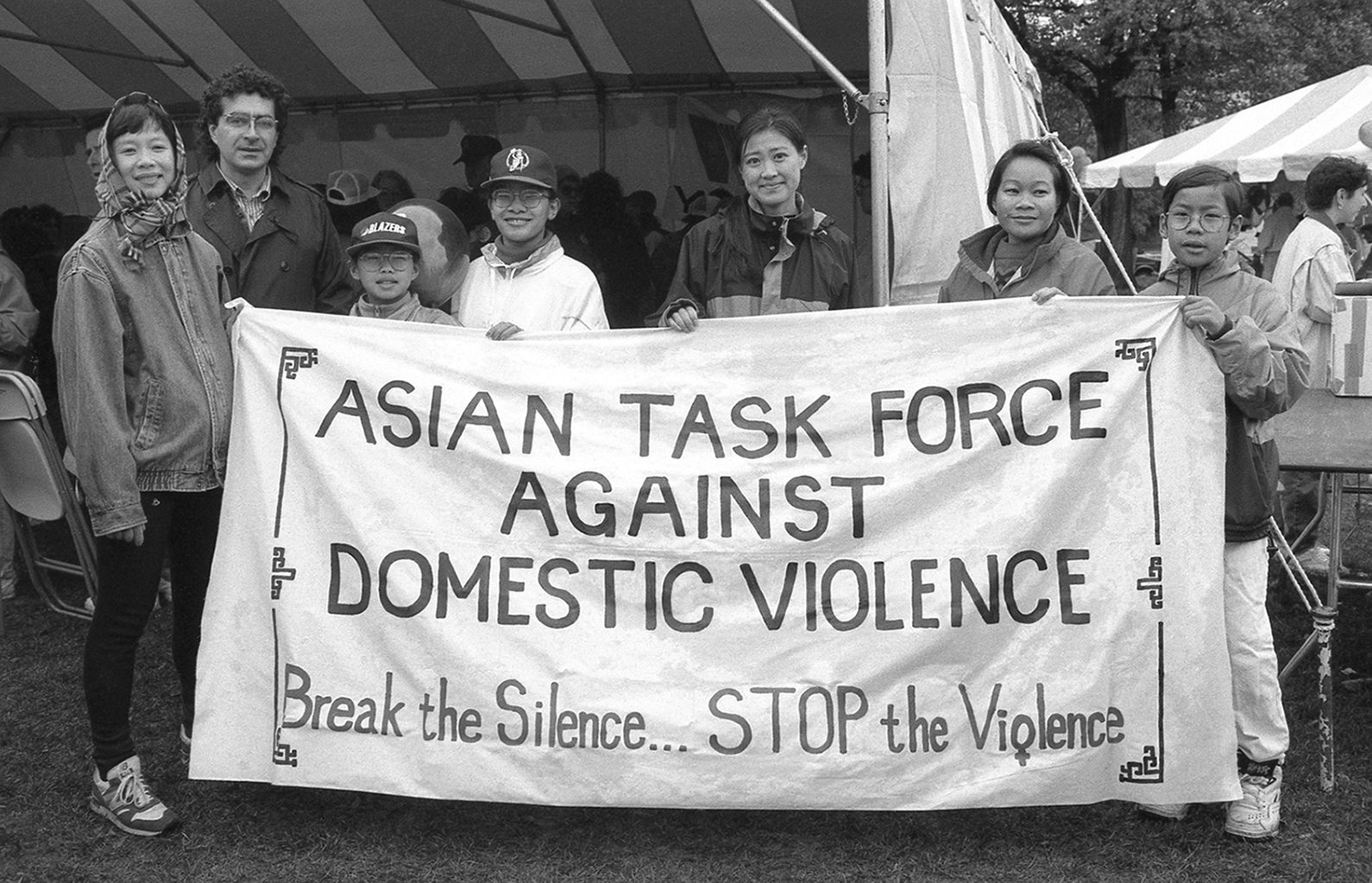Confronting Violence: Improving Women’s Lives
Blaisdell Medical Library hosts traveling exhibit from the National Library of Medicine
Blaisdell Medical Library (BML) is proud to host Confronting Violence: Improving Women’s Lives, a traveling exhibit from the National Library of Medicine (NLM) that explores the role nurses played in pushing the medical field to help identify, respond to, and prevent intimate partner violence (IPV). The exhibit tracks the rise of the battered women’s movement in the 1970s and 80s, the success of nurses who advocated for major changes to the medical profession to address and treat survivors of domestic violence, and the ongoing activism aimed at supporting and empowering those affected by intimate partner violence. In addition to the NLM exhibit, BML staff have put together a sub exhibit with information on the current state of IPV prevention and reporting in California using a mix of physical books, online resources, and printed materials.

Intimate partner violence is abuse or aggression that occurs in romantic relationships. For the purposes of this exhibit, we are using the term intimate partner violence rather than domestic violence, as that term encompasses violence committed not only by romantic partners, but also parents, grandparents, guardians etc. While domestic violence occurs when people are living together, intimate partner violence can occur even when partners live separately. Perpetrators of IPV use a pattern of behavior to maintain power and control over their partner, which can cause physical, sexual, and psychological harm to the survivor. Both perpetrators and victims can be of any race, gender, sexual orientation, or socioeconomic status. Depending on which state they live in, nurses and doctors must be on the lookout for the physical signs of abuse.
A person’s experience of violence and their health are inextricably linked. As healthcare providers, it is our duty to learn how to talk to our patients about their experiences of violence and connect them to resources to prevent and heal from violence.
Rachel Robitz, MD – Medical Director, Mental Health Urgent Care Clinic
California is one of six states in the US that has laws requiring mandatory reporting from healthcare providers in cases of adult abuse. According to California Penal Code §11160, a health practitioner who treats a patient for a physical injury they know or suspect was caused by abusive behavior must report it to local law enforcement. Mandatory reporters are required to make a telephone report as soon as possible and must submit a written report within two working days. When making a report, practitioners are required to include the name of the injured person, the injured person’s whereabouts, the character and extent of the person’s injuries, and the identity of the person who allegedly inflicted the injury.

Though we’ve come a long way since those first nurses began calling for change in the late seventies, we still have far to go when it comes to preventing intimate partner violence and supporting survivors. If you or someone you know is at risk for or currently experiencing intimate partner violence, there are several resources available online you can go to for help.
Resources
Websites with an asterisk (*) have a quick exit button for safety purposes.
- UCD Center for Advocacy, Resources & Education (CARE)
- Publications created by UCD campus center including crisis resource cards, education toolkits, fact sheets, etc. Also includes Spanish language materials.
- My Sister’s House*
- Serves Asian and Pacific Islander and other underserved women and children in Sacramento impacted by domestic violence, sexual assault, and human trafficking by providing a culturally appropriate and responsive safe haven, job training, and community services.
- WEAVE Inc.*
- Primary provider of crisis intervention services for survivors of domestic violence and the Rape Crisis Center for Sacramento County. Provides multilingual services.
- Empower Yolo*
- Offers twenty-four hour crisis intervention, emergency shelter, and other services for individuals and families in Yolo County affected by domestic violence and other forms of a violence in a manner that honors their cultural practices and traditions.
- Futures Without Violence*
- A national organization offering educational programs and training for professionals across many disciplines on improving responses to violence and abuse. Also works with advocates, policy makers, and others to educate people about the importance of respect and healthy relationships.
- National Domestic Violence Hotline* Call 800.799.7233 or Text BEGIN to 88788
- Crisis Line accessible to individuals affected by intimate partner violence. Includes phone, text, and online chat options.
- Disponible en español: https://espanol.thehotline.org/
- Rape, Abuse, and Incest National Network (RAINN) 24/7 Help Line 800.656.4673
- Operates the National Sexual Assault Hotline and carries out programs to prevent sexual violence and help survivors. Live chat available on their website.
- Disponible en español: https://www.rainn.org/es
Further Reading
The E-books and Articles in this list contain a mix of open access and restricted titles. Titles with an asterisk (*) at the end of the citation require Library VPN login for off-campus access.
E-Books
- Bailey, Rahn Kennedy, ed. Intimate Partner Violence : An Evidence-Based Approach. Cham: Springer, 2021. Print.*
- Bussolo, Maurizio., Nayantara. Sarma, and Anaise. Williams. It Takes Two (to Make Things Right) : Women’s Empowerment and Couple Concordance in South Asia. Washington, D.C: The World Bank, 2021. Print.*
- Dave, Dhaval M. et al. From Addiction to Aggression: The Spillover Effects of Opioid Policies on Intimate Partner Violence. Cambridge, Mass: National Bureau of Economic Research, 2023. Print.*
- Davies, Ceryl Teleri. Understanding Abuse in Young People’s Intimate Relationships : Female Perspectives on Power, Control and Gendered Social Norms. 1st ed. Bristol: Policy Press, 2023. Web.*
- Falkof, Nicky, Shilpa Phadke, and Srila Roy, eds. Intimacy and Injury : In the Wake of #MeToo in India and South Africa. Manchester: Manchester University Press, 2022. Print.*
- Fontes, Lisa Aronson. Invisible Chains : Overcoming Coercive Control in Your Intimate Relationship. 1st ed. New York, New York ; The Guilford Press, 2015. Print.*
- Goodmark, Leigh. Decriminalizing Domestic Violence : A Balanced Policy Approach to Intimate Partner Violence. Oakland, California: University of California Press, 2018. Web.*
- Guadalupe-Diaz, Xavier L. Transgressed : Intimate Partner Violence in Transgender Lives. New York: New York University Press, 2019. Web.*
- Harris, Matasha L. Returning Home : Intimate Partner Violence and Reentry. 1st ed. El Paso, Texas: LFB Scholarly Publishing LLC, 2015. Print.*
- Johnson, Holly, Natalia Ollus, and Sami Nevala. Violence Against Women : An International Perspective. 1. Aufl. New York, NY: Springer New York, 2008. Web.
- McOrmond-Plummer, Louise, Patricia Weiser Easteal, and Jennifer Y. Levy-Peck, eds. Intimate Partner Sexual Violence : A Multidisciplinary Guide to Improving Services and Support for Survivors of Rape and Abuse. London: Jessica Kingsley Publishers, 2014. Print.*
- Messinger, Adam M. LGBTQ Intimate Partner Violence : Lessons for Policy, Practice, and Research. Oakland, California: University of California Press, 2017. Print.*
- Niolon, Phyllis Holditch. Preventing Intimate Partner Violence across the Lifespan : A Technical Package of Programs, Policies, and Practices. Atlanta, Georgia: Division of Violence Prevention, National Center for Injury Prevention and Control, Centers for Disease Control and Prevention, 2017. Print.
- Sevcik, Irene, and Irene Sevcik. Overcoming Conflicting Loyalties : Intimate Partner Violence, Community Resources and Faith. Edmonton, Alberta: The University of Alberta Press, 2015. Web.*
Articles
- Alvarez, Carmen et al. “Provider Screening and Counseling for Intimate Partner Violence: A Systematic Review of Practices and Influencing Factors.” Trauma, Violence, & Abuse 18.5 (2017): 479–495. Web.*
- Breiding, Matthew J. “Prevalence and Characteristics of Sexual Violence, Stalking, and Intimate Partner Violence Victimization – National Intimate Partner and Sexual Violence Survey, United States, 2011.” American journal of public health (1971) 105.4 (2015): e11–e12. Web.
- Curry, Susan J et al. “Screening for Intimate Partner Violence, Elder Abuse, and Abuse of Vulnerable Adults: US Preventive Services Task Force Final Recommendation Statement.” JAMA : the journal of the American Medical Association 320.16 (2018): 1678–1687. Web.
- Decker, Michele R. et al. “Transforming the Healthcare Response to Intimate Partner Violence and Taking Best Practices to Scale.” Journal of women’s health (Larchmont, N.Y. 2002) 21.12 (2012): 1222–1229. Web.
- Evans, Megan L, Margo Lindauer, and Maureen E Farrell. “A Pandemic within a Pandemic — Intimate Partner Violence during Covid-19.” New England Journal of Medicine 383.24 (2020): 2302–2304. Web.
- Harpur, Paul, and Heather Douglas. “Disability and Domestic Violence: Protecting Survivors’ Human Rights.” Griffith law review 23.3 (2014): 405–433. Web.*
- Holmes, Samantha C. et al. “The Association Between Demographic, Mental Health, and Intimate Partner Violence Victimization Variables and Undergraduate Women’s Intimate Partner Violence Perpetration.” Journal of interpersonal violence 37.1–2 (2022): 33–57. Web.
- Jewkes, Rachel et al. “Women’s and Men’s Reports of Past-Year Prevalence of Intimate Partner Violence and Rape and Women’s Risk Factors for Intimate Partner Violence: A Multicountry Cross-Sectional Study in Asia and the Pacific.” PLoS medicine 14.9 (2017): e1002381–e1002381. Web.
- Lippy, Carrie et al. “The Impact of Mandatory Reporting Laws on Survivors of Intimate Partner Violence: Intersectionality, Help-Seeking and the Need for Change.” Journal of family violence 35.3 (2020): 255–267. Web.
- Miller, Elizabeth et al. “Cluster Randomized Trial of a College Health Center Sexual Violence Intervention.” American journal of preventive medicine 59.1 (2020): 98–108. Web.
Open Access
These items are available to everyone regardless of affiliation status.
- Johnson, Holly, Natalia Ollus, and Sami Nevala. Violence Against Women : An International Perspective. 1. Aufl. New York, NY: Springer New York, 2008. Web.
- Niolon, Phyllis Holditch. Preventing Intimate Partner Violence across the Lifespan : A Technical Package of Programs, Policies, and Practices. Atlanta, Georgia: Division of Violence Prevention, National Center for Injury Prevention and Control, Centers for Disease Control and Prevention, 2017. Print.
- Breiding, Matthew J. “Prevalence and Characteristics of Sexual Violence, Stalking, and Intimate Partner Violence Victimization – National Intimate Partner and Sexual Violence Survey, United States, 2011.” American journal of public health (1971) 105.4 (2015): e11–e12. Web.
- Curry, Susan J et al. “Screening for Intimate Partner Violence, Elder Abuse, and Abuse of Vulnerable Adults: US Preventive Services Task Force Final Recommendation Statement.” JAMA : the journal of the American Medical Association 320.16 (2018): 1678–1687. Web.
- Decker, Michele R. et al. “Transforming the Healthcare Response to Intimate Partner Violence and Taking Best Practices to Scale.” Journal of women’s health (Larchmont, N.Y. 2002) 21.12 (2012): 1222–1229. Web.
- Evans, Megan L, Margo Lindauer, and Maureen E Farrell. “A Pandemic within a Pandemic — Intimate Partner Violence during Covid-19.” New England Journal of Medicine 383.24 (2020): 2302–2304. Web.
- Holmes, Samantha C. et al. “The Association Between Demographic, Mental Health, and Intimate Partner Violence Victimization Variables and Undergraduate Women’s Intimate Partner Violence Perpetration.” Journal of interpersonal violence 37.1–2 (2022): 33–57. Web.
- Jewkes, Rachel et al. “Women’s and Men’s Reports of Past-Year Prevalence of Intimate Partner Violence and Rape and Women’s Risk Factors for Intimate Partner Violence: A Multicountry Cross-Sectional Study in Asia and the Pacific.” PLoS medicine 14.9 (2017): e1002381–e1002381. Web.
- Lippy, Carrie et al. “The Impact of Mandatory Reporting Laws on Survivors of Intimate Partner Violence: Intersectionality, Help-Seeking and the Need for Change.” Journal of family violence 35.3 (2020): 255–267. Web.
- Miller, Elizabeth et al. “Cluster Randomized Trial of a College Health Center Sexual Violence Intervention.” American journal of preventive medicine 59.1 (2020): 98–108. Web.